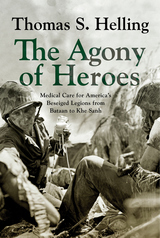8 start with F start with F
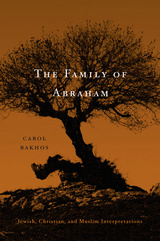
The term “Abrahamic religions” has gained considerable currency in both scholarly and ecumenical circles as a way of referring to Judaism, Christianity, and Islam. In The Family of Abraham, Carol Bakhos steps back from this convention to ask a frequently overlooked question: What, in fact, is Abrahamic about these three faiths? Exploring diverse stories and interpretations relating to the portrayal of Abraham, she reveals how he is venerated in these different scriptural traditions and how scriptural narratives have been pressed into service for nonreligious purposes.
Grounding her study in a close examination of ancient Jewish textual practices, primarily midrash, as well as medieval Muslim Stories of the Prophets and the writings of the early Church Fathers, Bakhos demonstrates that ancient and early-medieval readers often embellished the image of Abraham and his family—Sarah, Hagar, Ishmael, and Isaac. Her analysis dismantles pernicious misrepresentations of Abraham’s firstborn son, Ishmael, and provocatively challenges contemporary references to Judaism and Islam as sibling religions.
As Bakhos points out, an uncritical adoption of the term “Abrahamic religions” not only blinds us to the diverse interpretations and traditions of Judaism, Christianity, and Islam but also artificially separates these faiths from their historical contexts. In correcting mistaken assumptions about the narrative and theological significance of Abraham, The Family of Abraham sheds new light on key figures of three world religions.
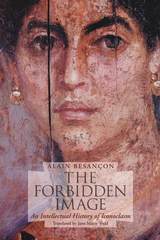
Philosophers and theologians have long engaged in intense debate and introspection over the representation of the deity, its possibilities and its proscriptions. The Forbidden Image traces the dual strains of “iconophilia” and iconoclasm, the privileging and prohibition of religious images, over a span of two and a half millennia in the West.
Alain Besançon’s work begins with a comprehensive examination of the status of the image in Greek, Judaic, Islamic, and Christian thought. The author then addresses arguments regarding the moral authority of the image in European Christianity from the medieval through the early modern periods. Besançon completes The Forbidden Image with an examination of how iconophilia and iconoclasm have been debated in the modern period.
“Even the reader who has heard something of the Byzantine quarrels about images and their theological background will be surprised by a learned and convincing interpretation of the works of Mondrian, Kandinsky, and Malevich in terms of religiously inspired iconoclasm. . . . This is an immensely rich and powerful masterpiece.”—Leszek Kolakowski, Times Literary Supplement
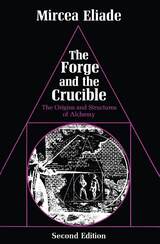
The new edition of The Forge and the Crucible contains an updated appendix, in which Eliade lists works on Chinese alchemy published in the past few years. He also discusses the importance of alchemy in Newton's scientific evolution.

A unique interreligious dialogue provides needed context for deeper understanding of interfaith relations, from ancient to modern times
Freedom is far from straightforward as a topic of comparative theology. While it is often identified with modernity and even postmodernity, freedom has long been an important topic for reflection by both Christians and Muslims, discussed in both the Bible and the Quran. Each faith has a different way of engaging with the idea of freedom shaped by the political context of their beginnings. The New Testament emerged in a region under occupation by the Roman Empire, whereas the Quran was first received in tribal Arabia, a stateless environment with political freedom.
Freedom: Christian and Muslim Perspectives, edited by Lucinda Mosher, considers how Christian and Muslim faith communities have historically addressed many facets of freedom. The book presents essays, historical and scriptural texts, and reflections. Topics include God's freedom, human freedom to obey God, autonomy versus heteronomy, autonomy versus self-governance, freedom from incapacitating addiction and desire, hermeneutic or discursive freedom vis-à-vis scripture and tradition, religious and political freedom, and the relationship between personal conviction and public order.
The rich insights expressed in this unique interfaith discussion will benefit readers—from students and scholars, to clerics and community leaders, to politicians and policymakers—who will gain a deeper understanding of how these two communities define freedom, how it is treated in both religious and secular texts, and how to make sense of it in the context of our contemporary lives.
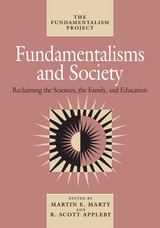
Edited by Martin E. Marty and R. Scott Appleby
Around the world, fundamentalist movements are profoundly
affecting the way we live. Misinformation and misperception
about fundamentalism exacerbate conflicts at home and abroad.
Yet policymakers, journalists, students, and others have
lacked any comprehensive resource on the explosive phenomenon
of fundamentalism. Now the Fundamentalism Project has
assembled an international team of scholars for a multivolume
assessment of the history, scope, sources, character, and
impact of fundamentalist movements within the world's major
religious traditions.
Fundamentalisms and Society shows how fundamentalist
movements have influenced human relations, education, women's
rights, and scientific research in over a dozen nations and
within the traditions of Islam, Judaism, Christianity,
Buddhism, and Hinduism. Drawn from the fields of
anthropology, sociology, history of religion, and history of
science, the contributors cover topics such as the
educational structures of Hindu revivalism, women in
fundamentalist Iran and Pakistan, and the creationist cosmos
of Protestant fundamentalism. In a concluding essay, William
H. McNeill situates contemporary fundamentalisms within a
world historical context.
The Fundamentalism Project, Volume 2
Martin E. Marty and R. Scott Appleby direct the
Fundamentalism Project. Marty, the Fairfax M. Cone
Distinguished Service Professor of the History of Modern
Christianity at the University of Chicago, is the senior
editor of the Christian Century and the author of
numerous books, including the multivolume Modern American
Religion, also published by the University of
Chicago Press. Appleby, a research associate at the
University of Chicago, is the author of “Church and
Age Unite!” The Modernist Impulse in American
Catholicism.
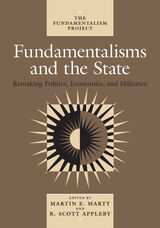
successful have they been in remaking political structures?
To answer this question, the contributors to this volume—
political scientists, historians of religion,
anthropologists, and sociologists—discuss the anti-
abortion movement, Operation Rescue in the United States, the
Islamic war of resistance in Afghanistan, Shi'ite
jurisprudence in Iran, and other issues. The volume
considers the effect that antisecular religious movements
have had over the past twenty-five years on national
economies, political parties, constitutional issues, and
international relations on five continents and within the
traditions of Islam, Christianity, Judaism, Buddhism,
Hinduism, and Sikhism. Marty and Appleby conclude with a
synthetic statement on the fundamentalist impact on polities,
economies, and state security.
The Fundamentalism Project, Volume 3
Martin E. Marty and R. Scott Appleby direct the
Fundamentalism Project. Marty, the Fairfax M. Cone
Distinguished Service Professor of the History of Modern
Christianity at the University of Chicago, is the senior
editor of the Christian Century and the author of
numerous books, including the multivolume Modern American
Religion, also published by the University of
Chicago Press. Appleby, a research associate at the
University of Chicago, is the author of “Church and
Age Unite!” The Modernist Impulse in American
Catholicism.
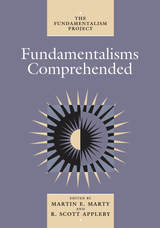
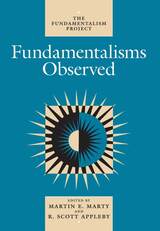
The contributors include sociologists, cultural anthropologists, and historians, some of whom have been participant-observers in the groups under consideration. As an analysis of the global resurgence of religion, Fundamentalisms Observed sheds new light on current religious movements and cultures from North America to the Far East.
READERS
Browse our collection.
PUBLISHERS
See BiblioVault's publisher services.
STUDENT SERVICES
Files for college accessibility offices.
UChicago Accessibility Resources
home | accessibility | search | about | contact us
BiblioVault ® 2001 - 2024
The University of Chicago Press



